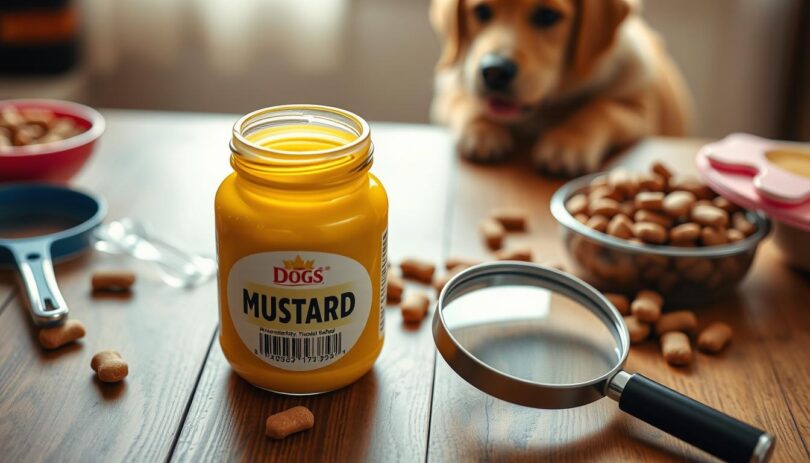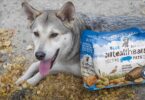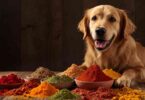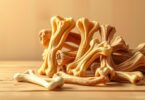Did you realize that more than 63 percent of pet owners feed their furry babies with human foods that have unsafe ingredients without realizing it? One common culprit? Mustard. This sour sauce, which is usually spread on burgers or hot dogs, conceals dangers that many parents do not consider.
Although an accidental small lick may not cause an emergency, even small quantities of this popular topping can be dangerous to pets. A study by Purina and Maven Pet points out that mustard seeds have substances that are poisonous to four-legged friends. Understanding these dangers helps keep tails wagging safely.
This guide delivers science-backed insights from veterinary nutrition experts. You will find out why some of the components in mustard-based products are harmful to health and what signs to look out for. Useful suggestions will enable you to make wise decisions when you are attending a backyard barbecue or a family dinner.
It could be yellow mustard, spicy mustards or gourmet blends, and we will deconstruct what pet parents need to know. So how can you enjoy your favorite tasting foods and make sure your companion is healthy? Let us see how you can make every bite you share with your pet delicious and harmless.
Exploring Mustard: Varieties, Ingredients, and Its Popular Appeal
Whether it is a backyard barbecue or a fancy kitchen, mustard is the zest in many dishes. It is a staple of American pantries due to its versatility, but what makes this condiment its kick–and its danger?
Popular Varieties: Yellow, Dijon, Honey, and More
Yellow mustard is the king of summer barbecues, as it is the best match with hot dogs and burgers. Dijon adds finesse to dressings by its sharp, wine-flavored taste. Honey mustard is a combination of sweet and spicy and is usually used with chicken tenders or pretzels.
Niche products such as whole-grain or beer-infused mustard satisfy foodies. These alternatives do well in social environments where daring tastes complement communal cuisine.
Key Ingredients and Toxic Compounds in Mustard
All types rely on mustard seeds, which contain isothiocyanate. This compound irritates pets’ digestive systems. Garlic powder or too much salt can be added to commercial versions, which doubles the risk.
Homemade recipes often use raw seeds, concentrating the toxin. Seeds may be diluted with vinegar in store-bought blends, although even minute amounts are dangerous. What people find as a taste enhancer is a poisonous atmosphere to four-legged family members.
Can Dogs Eat Mustard? Understanding the Risks and Safe Practices
Many guardians wonder about condiment safety during shared meals. The secret hazard of mustard is its seeds, which liberate isothiocyanate when they are crushed. This chemical induces inflammation in the digestive tract of pets as per Purina studies.
Mustard Seeds: Hidden Threat in Every Bite
All varieties—yellow, Dijon, or honey—contain these problematic seeds. Even a small quantity in sauces or dressings can cause an irritation to the stomach lining of a pet. Maven Pet observes that such symptoms as vomiting or lethargy can be observed in hours.
Dosage Matters: Small Quantities, Big Problems
No safe consumption level exists. A plate lick may be a little painful, but bigger amounts may lead to serious gastroenteritis. Watch for signs like abdominal pain or diarrhea.
Immediately contact a veterinarian if exposure occurs. Store food that contains condiments inaccessible, and use pet-friendly snacks when hosting a party. Regular check-ups help tailor safety plans for individual animals.
Spotting Mustard Poisoning: Symptoms and Immediate Care
Reactions can get out of hand when inquisitive companions take a nibble of human foods. The toxic elements of mustard tend to cause visible distress in 2-12 hours. Recognizing early warning signs helps guardians act decisively.
Common Signs: Gastrointestinal Distress and Behavior Changes
Persistent vomiting tops the list of red flags. Diarrhea—sometimes bloody—often follows, along with abdominal tenderness. Look out for strange lethargy or unwillingness to eat, which is an indication of underlying discomfort.
Drooling and pawing at the mouth indicate oral irritation. In severe cases, trembling or labored breathing may develop. The symptoms depend on the amount that is taken and the size of the animal.
Emergency Response Protocol
In case your pet exhibits gastrointestinal problems, remain composed but do not waste time. Follow these steps:
- Remove any remaining mustard sources
- Note the time of ingestion and approximate amount
- Contact your vet or animal poison control immediately
Never induce vomiting without professional guidance. For mild cases, hydration helps flush toxins. Severe reactions require intravenous fluids or anti-nausea medications.
Small breeds are easily underestimated by people in regard to the impact of a small amount. Better to be safe than sorry- early treatment is a game changer. Have emergency numbers handy when you are having family dinners or picnics where condiments are in plenty.
Wrapping Up: Ensuring Your Dog’s Health and Long-Term Safety
In the case of condiments, not every condiment is safe to pets. All the types, including honey-based mixes and spicy Dijon, have seeds or powder that is toxic to dogs. Reliable sources at Purina and Maven Pet state that there is no safe level since even small amounts can cause discomfort to the digestive system of your companion.
Monitor behavior closely if accidental exposure occurs. Such symptoms as vomiting or lethargy should be followed by calling a veterinarian. Human foods with mustard powder or greens should be stored safely and instead use vet-approved treats during meals.
A species-appropriate diet with no risky additives is a priority to long-term health. Be proactive and bookmark reputable pet-health sites and make regular check-ups. The knowledge gives the guardians the power to make decisions that ensure tails continue to wag safely many years to come.
FAQ
Are mustard greens safe for pets?
Isothiocyanates are found in trace quantities in mustard greens and may upset the digestive system of a dog. Although they are not as poisonous as seeds or prepared condiments, in large amounts they can lead to slight stomach upset. Always consult a veterinarian before introducing new greens.
What makes mustard powder risky for canines?
Concentrated mustard seeds are present in mustard powder, which produces toxic substances when combined with water. Vomiting, diarrhea or irritation of the mouth may occur even with small doses. Store spices securely to prevent accidental ingestion.
What is the time of onset of symptoms following ingestion of mustard by a dog?
Symptoms such as stomach pains or nausea usually appear in 1-2 hours. In severe cases with large quantities, there may be rapid breathing or lethargy. Immediate veterinary care is crucial if unusual behavior develops.
What household foods containing mustard should pet owners avoid?
Watch out on dressings, marinades or sauces such as BBQ or honey mustard dips. A lot of processed snacks and deli meats contain mustard powder as well. Opt for pet-safe alternatives when sharing human food.










Leave a Comment